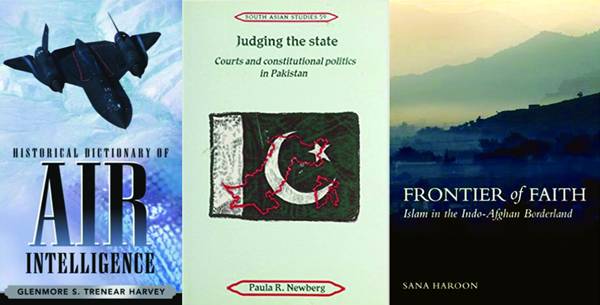
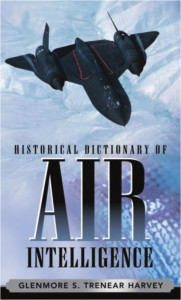
Historical Dictionary of Air Intelligence
Glenmore S. Trenear-Harvey
Scarecrow Press (paperback), 2009
PRs 1861
From the moment man learned how to ascend off the ground, the strategic significance of air intelligence became apparent. This relatively new discipline?the first dedicated air reconnaissance missions were undertaken in 1870 during the siege of Paris when tethered French balloons were employed to spot enemy positions and direct artillery fire onto them?has developed at an astonishing speed. Over the past century air intelligence has moved from hazardous observation balloons to micro-circuitry, which can send pictures from a video camera mounted on a remotely-controlled vehicle the size of a hummingbird.
The Historical Dictionary of Air Intelligence relates the evolving history of the rapidly advancing field of air intelligence. A chronology, an introductory essay, and cross-referenced dictionary entries on the agencies, agents, operations, equipment, tradecraft, and jargon of air intelligence make this reference as essential as it is fascinating.
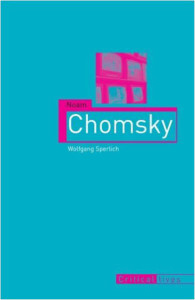
Chomsky
Wolfgang B. Sperlich
Reaktion Books (paperback), 2006
PRs 2090
“The intellectual tradition is one of servility to power, and if I didn’t betray it I’d be ashamed of myself.” This declaration by Noam Chomsky exemplifies the uncompromising radicalism that has long defined his life and work. A linguist, philosopher, prolific author, and political activist, Chomsky is one of the most influential Western intellectuals of the last half-century. Yet it is this very capaciousness that biographers and interpreters have struggled with, and as a result, there are very few readable accounts of Chomsky and his project. Wolfgang B. Sperlich surmounts this challenge with his succinct yet in-depth introduction to the thinker in Noam Chomsky, one of the new titles in the acclaimed Critical Lives series.
Beginning with Chomsky’s formative years as a sixteen-year-old student at the University of Pennsylvania, Sperlich traces his education in linguistics and politics in its rich historical context. He explores Chomsky’s main intellectual influences, particularly in language studies, and charts his strained relationship with mainstream American academia. Sperlich also offers an informed overview of Chomsky’s landmark linguistic contributions as a comprehensive introduction to his work, and he explains the latest developments in Chomskyan linguistics and how they influence research in fields as varied as neuroscience, biology, and evolution. Sperlich is equally attentive to Chomsky’s political activism: through Sperlich’s account we follow Chomsky from his pacifist-anarchist lectures and writings of the 1950s and 1960s to his seminal 1988 treatise, Manufacturing Consent, and his relentless criticism of the American government over two decades.
A compact and rich biographical study, Noam Chomsky is a brilliant introduction to one of the most polarizing intellectuals of our time, a thinker whose words continue to pierce the heart of public discourse.
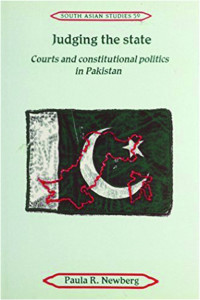
Judging the State, Courts and Constitutional Politics in Pakistan
Paula R. Newberg
Foundation Books (paperback), 2007
PRs 926
For almost five decades, Pakistan has encountered frequent unresolved political crises. They are woven into its concepts of political community, and have underscored uneasy relationships between state institutions and civil society. Pakistan’s politics has also been characterised by incomplete constitution- making, a process that has placed the burden of constitutional interpretation and political change on state instruments ranging from the bureaucracy to the military to the judiciary. The superior courts in particular have played unusually important roles in determining the country’s fate, often superseding legislatures and executives alike. In a penetrating and comprehensive study of the ways in which the superior judiciary has mediated relationships between state and society, Paula Newberg demonstrates how the courts have influenced the structure of the state, and their evolving jurisprudence has fashioned Pakistan’s constitutions and uncertain constitutionalism. By examining judicial decisions, including those that determined the fate of governments, she explores the ways that the courts have affected fundamental rights, the practice of politics, and Pakistan’s democratic prospects.
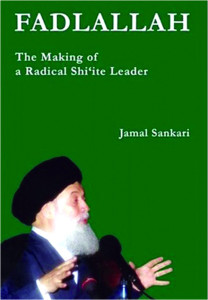
Fadlallah: The Making of a Radical Shi’ite Leader
Jamal Sankari
Saki Books (hardcover), 2005
PRs 2330
This book traces the career trajectory of one of the most prominent figures in modern political Islam, against a background of cultural, political and economic upheaval in Iran, Iraq, and Lebanon. From Sayyid Hussein Fadlallah’s early intellectual development through his scholastic and political engagements, Jamal Sankari assesses the cleric’s impact on both the resistance group Hizbullah and on the region as a whole.??Demonised by the West, and denounced by Muslim conservatives for his ‘moderation’ and ‘innovation’, Fadlallah was one of the first Islamic figures to condemn the events of 11 September while at the same time remaining amongst the harshest, most relentless critics of the US role in the Middle East.??Fadlallah is regarded by many as the spiritual leader of Hizbullah. But his emergence as one of the world’s pre-eminent Islamists would have taken place even without Hizbullah; his insistence on cross-denominational dialogue across the Arab and Muslim world has inspired many followers and emulators. Sankari provides extensive insight into the enigmatic, mulit-faceted personality of this extraordinary religious-political leader.
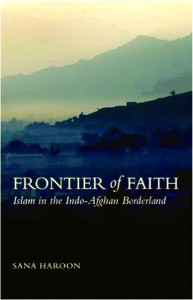
Frontier of Faith
Sana Haroon
C Hurst & Co Publishers Ltd (hardcover), 2007
PRs 3044
Frontier of Faith examines the history of Islam, especially that of local mullahs, in the North-West Frontier, a largely autonomous zone straddling the boundary of Pakistan and Afghanistan, from the late nineteenth century to the present. Haroon’s book is also highly relevant to the present, given that the area in question is now said to be the likely hiding place of Al Qaeda and its local Afghan and Pakistani allies. The Tribal Areas was established as a strategic buffer zone for British India, but the impact of colonial rule was minimal. The autonomy that resulted emphasised the role and importance of the local mullahs, who jealously protected the powers they accrued to themselves. After the partition of India in 1947, the Tribal Areas maintained its status as an autonomous region in both the Afghan and Pakistani imaginations and cartographic descriptions. The mullahs contributed to armed mobilisations over the next half century, in return for which nationalist actors protected their vested interest in regional autonomy. Thus the region became the hinterland of successive, contradictory jihads in support of Pakhtun ethnicism, anti-colonial nationalism, Pakistani territorialism, religious revivalism, Afghan anti-Soviet resistance, and latterly anti-Americanism. Haroon’s book is thus essential reading for all those wishing to understand the Pakistan-Afghanistan borderlands today and the role played there by the mullahs and their allies.

